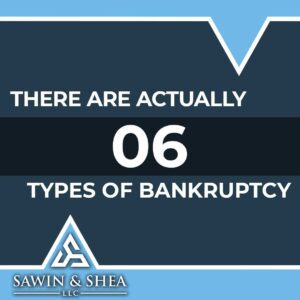Staring down mountains of debt can feel overwhelming. Medical bills, credit cards, payday loans, and struggling businesses – it can seem like the letters and calls from creditors will never stop. Bankruptcy filings for both individuals and businesses are on the rise.
Since 2005, a debtor education course from an approved provider is mandatory for anyone who files for bankruptcy. These courses are designed to give filers the money management skills they need to set them up for success moving forward.
Debtor education classes provide customized guidance based on your unique circumstances. They cover topics like creating a budget, using credit wisely, and avoiding financial pitfalls down the road. In short, they prepare you for the challenges that come with rebuilding your finances after bankruptcy.
Understanding Chapter 7 vs. Chapter 13 Bankruptcy
There are 6 types of bankruptcy, but two of the most common types are Chapter 7 and Chapter 13. (Each type of bankruptcy is named after the chapter of the code that describes it.)
There are some key differences between these two types of bankruptcy.
Chapter 7 Bankruptcy:

- Straight liquidation bankruptcy that wipes out eligible debt completely
- Stop creditor harassment, lawsuits, wage garnishment
- Get a discharge of most unsecured debts like credit cards and medical bills in just a few months
- Certain assets like cars or houses can be “reaffirmed” and kept after bankruptcy
- Qualification depends on means test and income limits
- Best for those with minimal assets/equity, trouble paying for necessities
- Can’t file Chapter 7 again for 8 years
- Available to both individuals and businesses
Chapter 13 Bankruptcy:
- Debt reorganization, not liquidation; Pays back a portion of the debt over 3-5 years
- Stop foreclosures and repossessions while repaying arrears through a payment plan
- Lower interest rates or reduce loan principal balances
- Allows you to catch up on secured debt like mortgages and car loans
- Protects co-signers by halting collection against them
- More flexibility to retain assets with equity
- Option for those who don’t qualify for Chapter 7
- Only available to individuals (not businesses)
- Discharge remaining balances at the end of the repayment plan term
What Is Debtor Education?

Congress passed the Bankruptcy Abuse Prevention and Consumer Protection Act (BAPCPA) in 2005. Since then, bankruptcy filers have been required to take both a bankruptcy credit counseling course and a debtor education course.
Your pre-bankruptcy credit counseling must be completed before filing for bankruptcy, and debtor education must be completed after filing. Your debtor education provider must meet very specific requirements to become a qualified debtor education provider.
There are stringent requirements for the debtor education course, including the following:
- The course must be at least 2 hours long
- Instruction must cover all of the substantive topics that are included in the Debtor Education Rule
- Can be offered online or in person
- Mandatory for all individual filers in Chapter 7 or 13 bankruptcies
- Must be completed after filing the bankruptcy petition but before the case is discharged
- Can only be offered by a US Trustee or a provider that has been approved by the bankruptcy administrator
Selection of topics covered in the course
During your debtor education course, you can expect to cover these topics, among others:
Budgeting
- Creating realistic budgets
- Tracking income and expenses
- Prioritizing spending on needs vs wants
- Planning for irregular expenses
Savings & Rebuilding Credit
- Establishing emergency funds
- Understanding the value of savings
- Obtaining and using credit wisely after bankruptcy
- Monitoring credit reports and scores
Avoiding Financial Pitfalls
- Identifying spending triggers
- Steering clear of predatory lending
- Consolidating multiple high-interest debts
Post-Bankruptcy Planning
- Tax implications post discharge
- Expectations for creditors and collection
- Options to keep property after bankruptcy
The Importance of Working with a Bankruptcy Attorney
It is imperative to work with an experienced attorney when you go through the bankruptcy process, as it includes complex paperwork, extensive court procedures, and very strict deadlines. Your attorney will guide you through each step of the process.
Some of the things your attorney can do on your behalf include:

- Ensure correct filing
- Protect your assets
- Deal with creditors
- Develop optimal payment plans
The bottom line is that working with a knowledgeable attorney will help minimize your stress while giving your case the best chance at providing meaningful financial relief.
Choosing a Debtor Education Provider
Not all debtor education courses are created equal. As you look for mandatory financial management training, these things can help you make up your mind.
Approved Status: Make sure the provider is authorized by the bankruptcy administrator in your state. Approvals are generally granted only to reputable agencies, so this helps weed out disreputable providers.
Qualified Instructors: Seek out courses that are led by certified credit counselors and financial educators, as this will translate to a more tailored and insightful course. Good teachers transform the requirement into a truly valuable learning experience.
Reasonable Fees: Legitimate providers offer courses for less than $100 in most cases. If this fee would cause hardship, you can always ask if the provider will use a sliding scale for your enrollment fees.
Guidance: Opting for a course from an established bankruptcy law firm often means gaining financial skills guidance from professionals well-versed in bankruptcy law and processes.
Sawin & Shea: Indiana Bankruptcy Attorneys
The bankruptcy law firm of Sawin & Shea checks all the boxes when it comes to choosing where to take your debtor education course. Our attorneys provide compassionate guidance at reasonable rates for Central Indiana residents looking to make the most out of their bankruptcy discharge.
Sign up for our courses online, and please reach out to us or call 317-759-1483 if you have any questions!



